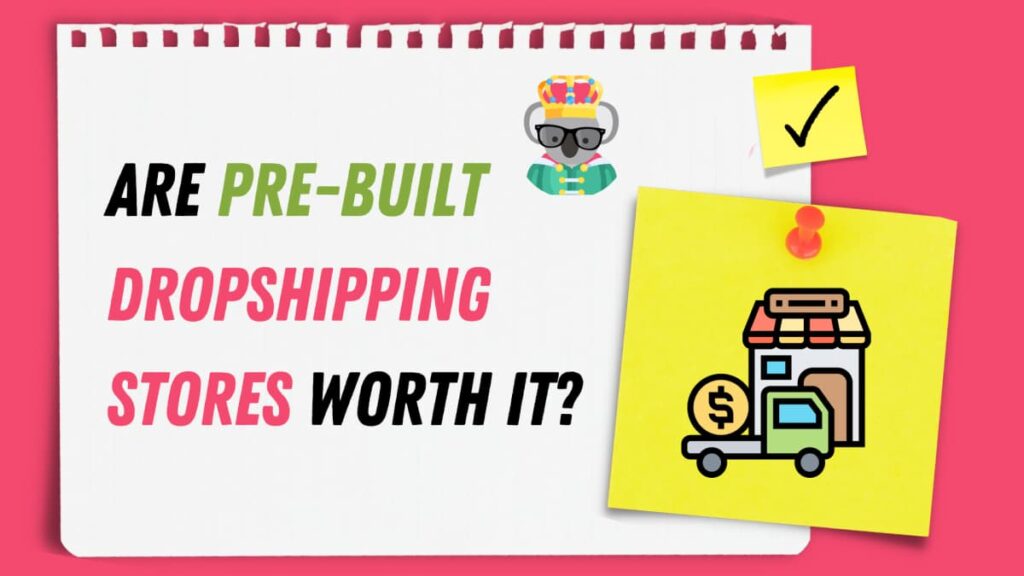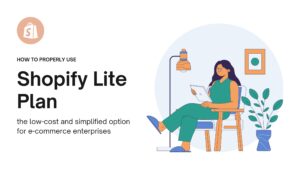Let’s discuss Dropshipping stores, especially those that are prebuilt and ready to use. More specifically, this article will explore the following question: Are pre-built dropshipping stores worth it? Further down, we’ll also uncover the pros and cons of pre-built dropshipping stores and the 10 best marketplaces to buy them.
The Benefits of Pre-Built Dropshipping Stores
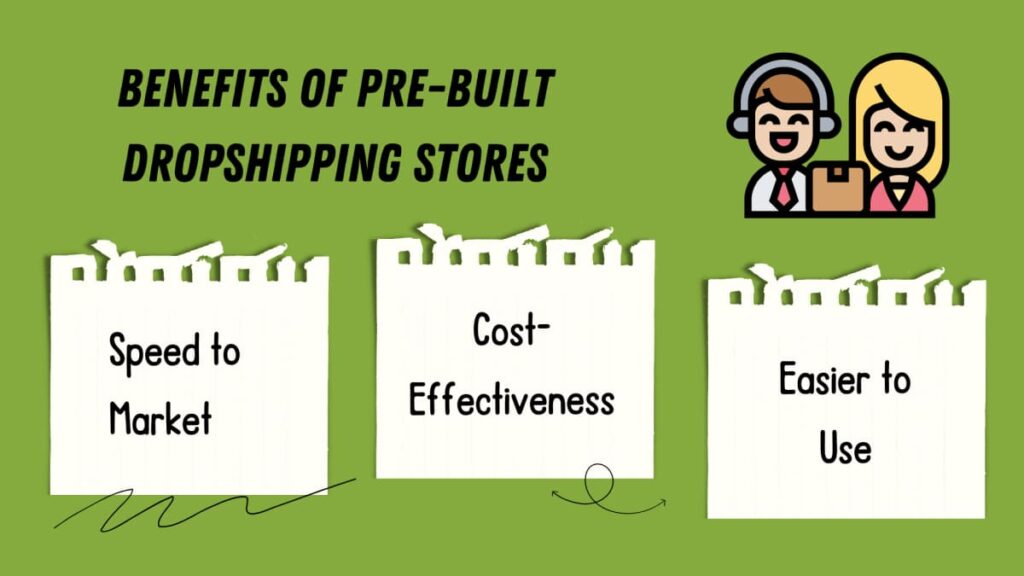
A pre-built dropshipping store offers numerous advantages to those who start this kind of business. To assist you, we will explore some of them below.
Speed to Market
One of the most important advantages of pre-built dropshipping stores is their speed to market. Ordinary stores need more time to develop and prepare to open, while pre-built dropshipping stores can be ready to use in a couple of days. They need minimal set-up time, and users can learn the basic operation functions in no time.
Entrepreneurs don’t need to worry about design and development but rather focus on marketing and sales. That means you buy a business that has already proved its success on the market, so you can start selling immediately and making profits.
Cost-Effectiveness
Unlike traditional stores, opening a pre-built dropshipping store doesn’t require a big investment, reducing the danger of losing money. You also skip the expenses for design and development and can also get a discount, which is a plus.
This option is a more accessible entrance into the e-commerce field for those who want to open a store on a budget. You also save a lot of time since you skip all the researching and sourcing products, and everything is pre-arranged for you.
Easier to Use
The best pre-built dropshipping stores usually have simple interfaces and are user-friendly, so even those with limited technical skills can use them effectively. These stores have built-in templates and simple order management, so users can focus on expanding their business and not worry about the technical aspects of the store.
The Cons of Pre-Built Dropshipping Stores: Hidden Costs and Limitations
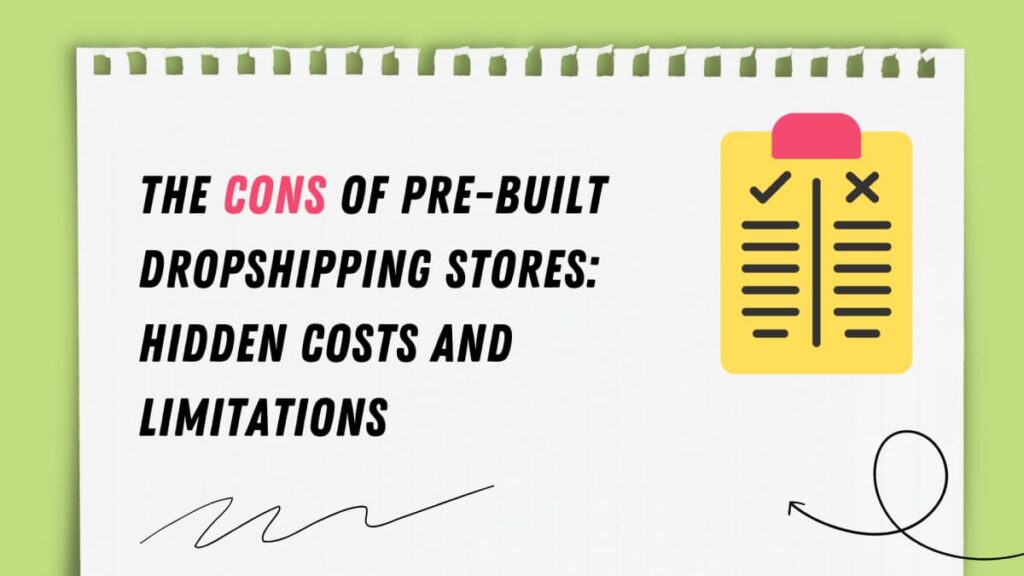
No matter how important and numerous the advantages of pre-built stores are, we must also mention the cons of pre-built dropshipping stores. It helps prepare you for any potential issue ahead.
Generic Design and Branding
These stores usually have generic designs and branding, which might be a drawback. They often use pre-made templates and themes, so you might need help developing your brand identity and standing out from the other online stores.
Since many stores use the same layouts, attracting loyal customers and being noticed in the crowded market of dropshipping stores can be a struggle. Stores do better when they have a personal touch, and buyers can feel the love and effort invested in creating them. That is why customizable stores are sometimes a better option for those who have the time, money, and energy to invest.
Limited Control and Customization
Another disadvantage of these stores is the fact that they might need more control and customization options. Custom-built stores offer users multiple options for modifying features, functionalities, and product offerings, and ready-made stores are more modest in their features.
Sometimes, users may find it hard to implement new plugins or third-party tools or make a noticeable change to the look or functionality of their store. It can make it difficult to adapt to new trends and customer demands.
When you start an online store, the pre-built dropshipping store may seem enough to you. However, if you want to expand it and add some additional features later on, you may encounter a situation with limited options available.
Dependence on External Factors
When entrepreneurs buy a ready-made dropshipping store, they rely on external factors and accept the seller’s product quality, supply management, and pricing. All these can bring some uncertainty and risk to the business because the supply of the products, the pricing, and the delivery times may fluctuate and impact the profitability of the store.
Buyers do not participate in the store’s creation, so their influence is limited, which might make them feel insecure about the store and its future development.
Who Can Benefit from Buying Pre-Built Stores
Pre-made dropshipping stores may be exactly what you are looking for if you are after convenience and speed. They allow opening a store and entering the e-commerce world without building one from scratch. Also, they are the perfect option for people who have limited technical knowledge and skills and need a user-friendly platform.
They allow you to eliminate the need for development and design of the store so you can decide to start your own, buy it as a premade option, and start the business within a few days, which is very convenient. So, if you ask yourself: are pre-built dropshipping stores worth it? Yes, they are.
Who Should Consider Building Their Own Store
Building yours may be a better option if you want a store customized for your specific needs. Since you decided to build open, you surely have a clear idea of how your store should be. You’ll want to have power over its development and design, so you should choose to go with a custom-built store.
Those of you who have the technical skills shouldn’t think twice — building your own store is the perfect option for you. When building your own store from scratch, you can add any features you like and create it according to your specific needs and wishes.
Factors to Consider When Buying a Prebuilt Dropshipping Store
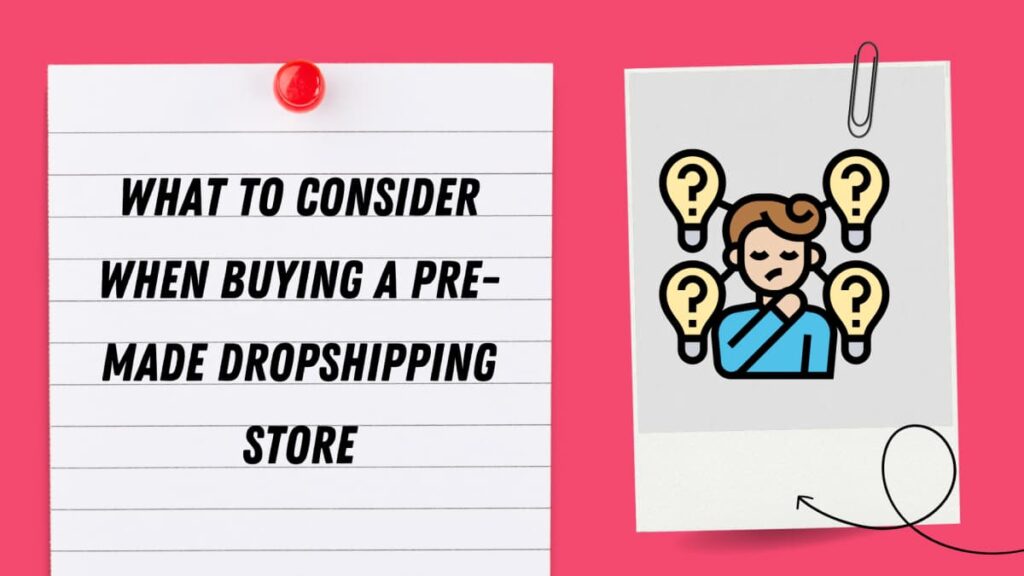
Before deciding to buy a pre-made dropshipping store, you need to consider certain things. This will really facilitate your decision-making process. So, let’s explore these factors.
Choose a Niche That You are Passionate About
Your success depends on how passionate you are about the business you run. Since you are going forward with opening a pre-made dropshipping store, you must have set your mind on a niche that you are passionate about. Always choose a niche that aligns with your interests and expertise. For example, if you love music and you play a musical instrument, you can choose to run a music store. Choosing something you feel strongly about will surely help to make your store more successful and trending.
We advise choosing a niche you love because we tend to be more motivated and desire success when we do something we love and care about. Also, if your clients feel your enthusiasm and love for what you do, they will trust you more, and you will make a more genuine connection with them.
Revenue and Traffic History
Check the revenue and traffic history of the ready-made dropshipping store so you can plan future performance. That way, you can get information about the store’s performance and stability.
When you know what to expect, you can plan your store’s future growth, the marketing strategies that need to be incorporated, and how it should develop. You want no surprises when you do business, so the more information about the store you have, the better you can plan your future development strategies.
Social Media Presence and Engagement
Social media presence and engagement are some of the most important aspects of your store that will bring you customers and profits. Whether a store has good customer engagement, stable follower growth, and brand visibility is crucial for its future work and success.
Here is another thing to think about before buying a store so you know how the store performed in this field in the past and what to expect in the future in terms of building a loyal customer base. If your store has a lot of followers on social media, that means more community engagement, traffic, and profit for your store.
Customer Base and Reviews
The level of customer satisfaction will pre-determine how your store will perform in the future. Check customer reviews and evaluate the store’s customer base to be informed about the store’s reputation. If a store has positive reviews and its customers are satisfied, it means that the products are of good quality, the store operates well and has good communication with its clients.
Negative feedback from customers will mean that a store doesn’t operate well and has some areas for improvement. Also, see if the store gave customers prompt feedback and fix any issues in that field.
Supplier Relationships and Fulfillment Process
You need to check the supplier relationships and the fulfillment process to determine whether the whole management process will flow smoothly and what problems to expect. You are looking for efficient order fulfillment and business management so you can maintain high product quality and timely delivery that will keep your customers satisfied.
Strong and high-quality relationships with your suppliers will ensure the future success of your business. This is why it is worth investing time and energy in building good relationships with the companies you cooperate with.
Design and Branding
You want to be recognizable and stand out from the crowd, so you should check the store’s design and branding elements. These are crucial factors in attracting new customers and keeping the old ones. You also want to have a variety of options available so you can develop a store that will be appealing and easy to use.
Pricing
Price may be another important consideration. Check all the similar offers on the market and choose the option that best suits your needs so you can be competitive and profitable. If the pricing is too high, it may deter potential clients, and if it is too low, it may compromise profitability. You need sustainable revenue, so you need to analyze and plan this aspect carefully.
Ongoing Costs
Behind the management of every dropshipping store, there are some ongoing costs that might not be noticeable at first sight. These include hosting fees, domain renewal, platform subscriptions, or marketing expenses. When you assess the ongoing costs, you can plan your budget.
Your Own Skills and Experience
The future success of your store will mainly depend on your own skills and expertise. Think about that and assess whether you have the necessary expertise in fields such as marketing, e-commerce, and customer service to develop the business successfully and with profitability.
Exit Strategy
You start your store to continue developing it in the future, but what if things don’t go as planned? You need to plan your actions should you decide to sell the store in the future. Think about things like market trends, buyer demand, and possible exit options to maximize the value of your investment and make a smooth and easy transition.
Where to Buy Pre-Built Dropshipping Stores 2024 (10 Best Options)
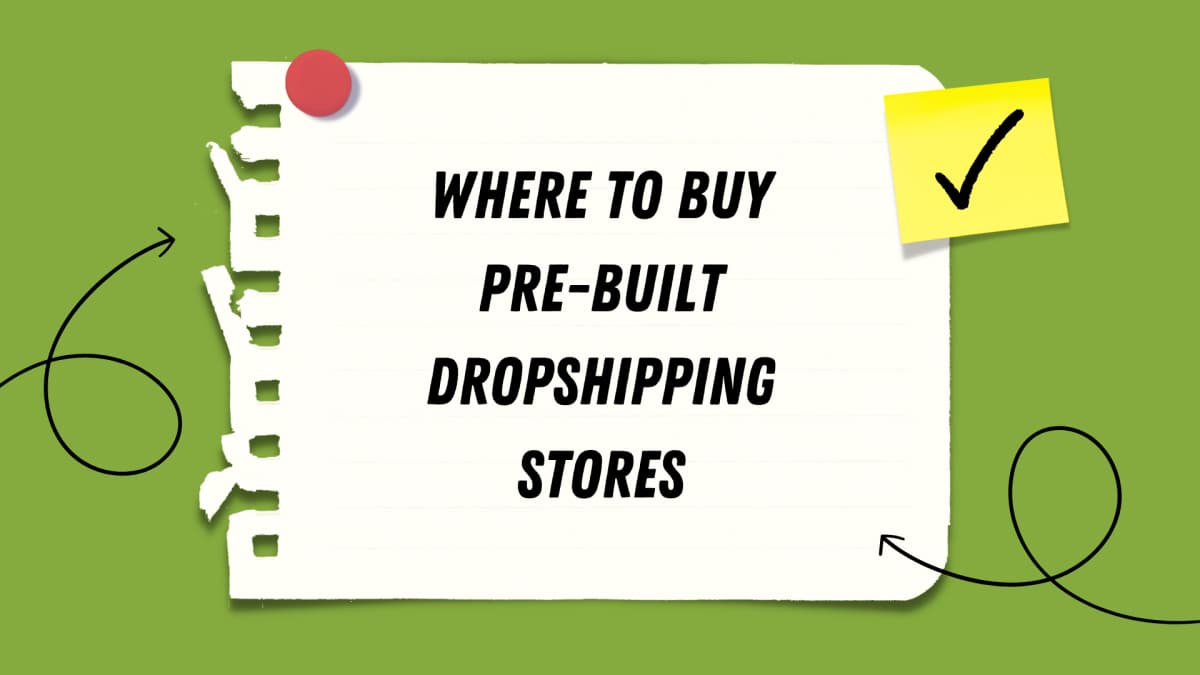
If you are considering buying a premade dropshipping business but are not sure where to look or if it is the right thing for you, check Koala Inspector. There, you can find a detailed analysis of the best platforms, their features, the importance of choosing the right store for you, and much more. We have also created a list of the ten best sites where you can purchase a pre-built dropshipping store and start your online business.
1. Flippa
Flippa is one of the most widely used websites for buying and selling online businesses. One of the most convenient aspects of Flippa is its user-friendly interface that allows you to browse the platform easily. It also has web filters that enable users to find exactly what they need. Users can also take advantage of the detailed analytics that shows the potential development of the site.
As a negative feature, we need to mention the escrow fees that users must pay due to their use of third-party software and the danger of getting scammed due to Flippa’s policy of accepting any site.
Flippa has many sites, and their prices can vary from $10K to $10M+. They also have listing packages, where users can choose between Entry ($29), Boosted ($49), and Premium ($199).
2. Empire Flippers
This site has become famous for listing high-end businesses, and it’s one of the first marketplaces. In its listings, it includes every important statistic about the businesses. It has a scrutinous vetting process to ensure profitability and legitimacy. As a positive thing, it has a good support service that provides all the needed support for clients, from purchase support to legal proceedings.
Empire Flippers specializes in high-quality online businesses, and their prices are slightly higher than usual. Currently, the cheapest listing they offer is around $28k, and the most expensive listings go up to $4,2mil.
3. AliDropship
This is a platform that offers pre-built dropshipping stores for sale and also has tools for creating custom-made stores using the AliDropship Plugin. You get full ownership when you build your store or purchase a ready-made dropshipping store. The platform also has an automation system that helps users market and manage their businesses. One drawback of the platform is that it has limited design options, and most of the functions are locked.
When we talk about the pricing, we have to mention the pre-built package that is free for the first 14 days, and after that, it costs $39/m. You can design your own store by making a single purchase of $89.
4. Brandafy
This platform supports buyers by helping them start and grow their businesses profitably. They offer turnkey solutions like pre-made dropshipping stores with branded products. Users can take advantage of a wide list of good-quality sites that deliver the stores in 1 to 3 days, which is quite fast.
The stores come with lifetime support and supplier integration features, which are quite handy. Their support system is comprehensive, and they show no noticeable drawbacks.
They offer the pre-built stores for free, a store package for $17, and another package that includes store management and assistance for $1,297/m.
5. StartStorez
Clients can find ready-to-launch dropshipping stores in different niches. To help them start their stores successfully, they also offer marketing services. The prices of their stores depend on the number of products you plan to list on them and not on the age of the store.
Their basic plan has all the essential features you will need to start your business journey. With just a few clicks, you can add as many items to the list as you like. They also have 24/7 client support, which is quite convenient.
StartStorez prices are based on the number of stores. A store with one product costs $65/m, a store with 12 products costs $99/m, and a store with 30 products costs $129/m.
6. Acquire
Acquire is another marketplace for buying and selling businesses, including dropshipping stores. It offers a wide selection of high-quality listings, resources, and guidance for buyers to start working with the store effectively.
Acquire shows all the basic statistics, like potential and statistics, and additional financial metrics. The site is pretty secure and easy to navigate, and that makes it very convenient for users. As a drawback, they only offer annual subscriptions.
Acquire offers three pricing options: basic, premium, and platinum. The basic plan is free of charge, and you can see the listings. The premium plan costs $390/ year, and the platinum plan, which includes more advanced options, is $780/year.
7. Dropbuild
Dropbuild is a platform that offers pre-made dropshipping stores for experienced and beginner entrepreneurs. The reviews by clients about this platform are mostly positive. They send buyers a selection of niches and products, and after that is decided upon, Drobuild then works on the store design and products.
A positive aspect is that they create video ads and marketing campaigns for you, and they also give you a list of suppliers. They guarantee satisfaction by giving users time to review the store before buying it.
At Dropbuild, they don’t have subscriptions, so if you want a one-product store, you will pay $449 for lifetime support and $599 for a niche store.
8. DropCommerce
This platform includes stores that offer high-quality branded products personally picked by their team. Their focus is mainly on product quality and customer satisfaction. What distinguishes them from other platforms is that if there is a problem with the order, you don’t have to contact the supplier – DropCommerce will refund you. It is easy to integrate with other platforms and is known for fast delivery times.
DropCommerce offers 5 pricing plans with different features. You can browse their platform and make orders with the free plan, but that is all. The basic plan costs $19/m, and you get 25 products, while for $49/m, you have 250 products available. The professional and executive plans cost $89/m and $149/m, and the number of products is unlimited.
9. Ecommerceify
If you are looking for a high-quality, pre-built dropshipping store with ongoing support, this is the right platform for you. They always provide what they claim to offer, and their delivery times are quite short compared to other platforms. An important positive feature of this site is that after you buy the store, you have full ownership. Clients get complete support, but only for the advanced plan, which is a drawback.
The prices for the custom store are $199 as a one-time payment for the basic plan and $349 for the advanced plan that includes SEO and 20 social media posts. The pre-built stores have packages of $149 and $299.
10.DropshipForSale
DropshipForSale offers pre-made stores across different niches and customization and branding options. It helps buyers by providing detailed information about every listing and expensive customer support. Apart from some users reporting problems with site transfers, this platform has no noticeable drawbacks.
We noticed that the pricing at DropShipForSale varies a lot. The basic plan for creating a site is only $20, but if you want to buy a premade store, the prices range between $399 and $1,250.

